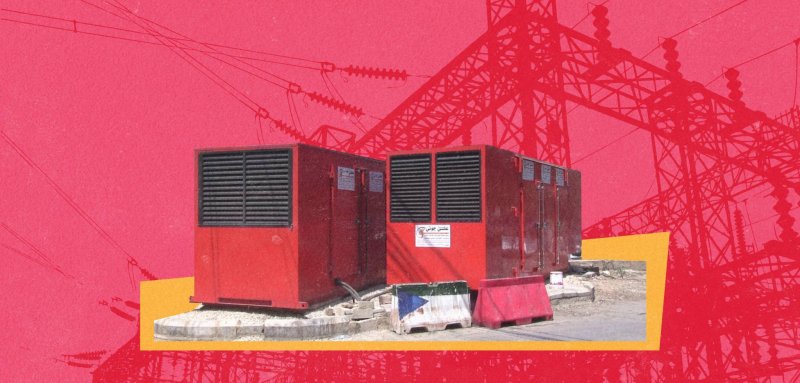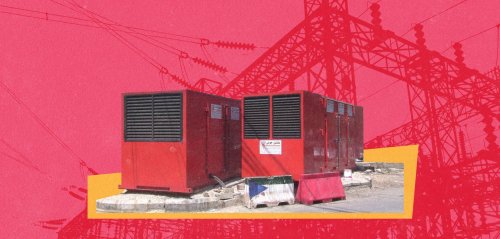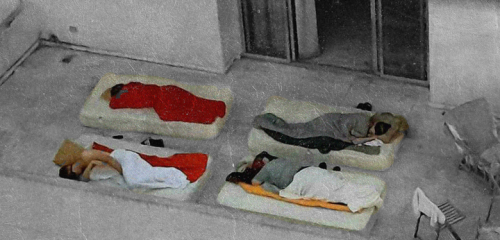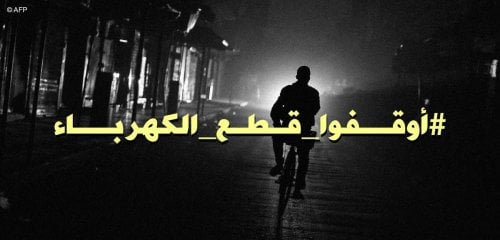Anyone who follows the way private generator owners work in Lebanon, especially in its major cities, is aware of the extent of their control and domination, not only over the streets that they have made themselves lords over, but also over the lives of Lebanese citizens.
In Lebanon today, or in the majority of its regions, the generator owner decides the pricing, he decides where you get to subscribe, and he has the power to cut off your electricity without warning. In addition to the fact that a number of private generator owners do not adhere to the official pricing and tariffs, installing electricity meters for citizens, or adopting specific electricity hours, some of them have gone as far as stealing from the state itself, by stealing the state's electricity and selling it to citizens under the pretext that it is produced by their own generators.
Rumors of the theft, confirmed
Abbas, a young man from the south who lives in the Basta al-Tahta area of the capital Beirut, tells Raseef22 how the generator owner who controls the street where he lives, under with the cover and protection of officials from the Shiite duo, charges $100 for every 5 amperes, even though he supplies Abbas's house with electricity for only 12 hours. Abbas and a number of subscribers have asked him several times to install electricity meters, but the owner refused to do so, claiming that the meter would result in losses for him.
Lebanon's Electricité du Liban, with the support of the security forces, caught him red-handed stealing the state's electricity and selling it to the citizens
According to the administrative division, Basta al-Tahta region includes Basta al-Tahta, Basta al-Fawqa, Khandaq al-Ghamiq, Hay el-Lija, and Zuqaq al-Blat neighborhoods. There are areas that include a predominantly Shiite presence, that resulted from displacement from southern Lebanon due to repeated Israeli attacks, and families escaping from the Israeli killings starting in 1948, until after the invasion in 1982.
What angered Abbas, who refused to give his full name for fear of being subjected to harassment or retaliation, is the private generator – which is only ten meters away from his home – being continuously on and working, but not feeding the street he is in, at the same time as the state electricity outage in the neighborhood. This is what caused him to grow suspicious, and his curiosity prompted him to go on a tour to check several generators owned by the same owner, to find that the electricity boxes of the private subscription network reach the state electricity, of which one of them feeds his house, while at the same time, the private generator is turned off. So it turned out that the owner of the private generators is feeding neighborhoods that are cut off from state electricity from neighborhoods where the state electricity is present, and passing it off as his own private electricity, in a blatant theft in broad daylight.
In Lebanon today, or in the majority of its regions, the generator owner decides the pricing, he decides where you get to subscribe, and he has the power to cut off your electricity without warning
For his part, Majed, who lives on Barbour Street, which contains a mixture of Shiite and Sunni residents, confirms the theft of state electricity by private generator owners, "The owner of our generator in the neighborhood set up a large station in one of the underground warehouses, and the residents of the neighborhood know that he steals electricity through large cables from one of the electricity rooms belonging to Electricité du Liban (EDL). One day his station burned down as a result of a technical error, but the security forces did not attend to inspect the incident, and no one dared to go into the warehouse to see what really happened, because he is protected by the dominant political powers."
These violations are not limited to the areas where the Shia duo is present. In many Lebanese areas, where there is partisan and political control, we see protection for the owners of generators, which enhances their power, and it is likely that there are common interests between party officials in the areas and neighborhoods with generator owners.
How is the theft carried out?
Previous testimonies confirm the news of the arrest of the owner of a private generator in the southern Lebanese city of Saida, about two weeks ago, as the Electricité du Liban (EDL), with the support of the security forces, caught him red-handed stealing state electricity and selling it to citizens. A violation report was written up against him and he was arrested, according to what a private source at Electricité du Liban told Raseef22.
The source pointed out that "the presence of private generator networks, which consist of 10 to 15 cables on the same poles that carry the state's Electricité du Liban power cables, facilitates the theft process, as these cables are mixed with each other, and here, the generator owner steals from the Electricité du Liban power line. Due to the absence of modern devices that detect wastage, technicians at the institution are forced to inspect all lines by monitoring them carefully to ensure their safety, and the interference on the poles sometimes makes it difficult to detect any theft taking place.
Some wonder about the possibility that there could be a collusion between the owners of private generators and the technicians working in the institution in order to carry out the theft operation. However, the source excludes this possibility and says, "If the theft is revealed, all those involved in the process will appear in the investigation. Nevertheless, the owners of the private generators have electrical technicians who know these tricks and do them," pointing out that it is not the first time that such an operation has occurred and that Electricité du Liban suppresses it. Two years ago, a person was arrested for the same crime and fined by the judiciary.
In addition to the fact that many private generator owners do not adhere to the official pricing, some of them have gone as far as stealing the state's electricity and selling it to citizens under the guise that it's produced by their own generators
Where are the state authorities?
According to legislative decree No. 18, issued in 1953, the governor was given broad powers to intervene, control violations, monitor the operation of public facilities and public safety, and anything that interferes in the affairs of citizens and their lives. He also has the right to write violation reports against violating generator owners, confiscate their generators and take over the task of operating it based on a judicial order.
Here, it was necessary to ask the governor of Beirut, Judge Marwan Abboud, about his knowledge of these violations within his governorate. He tells Raseef22 that he had heard reports about these thefts carried out by some private generators owners, but that they were not confirmed because the governorate cannot follow up on everything within its jurisdiction in light of the shortage in human resources. He adds, "I cannot search in of Beirut. As soon as we receive accurate information, we will act. I have heard such talk, but we do not have confirmed information, and citizens who are aware of such transgressions should inform us so that we can take action."
He explains that "it is the mission of Electricité du Liban to detect and pursue those who steal electricity, and the corporation has carried out campaigns to remove encroachments on the network with the support of the security forces. If we in the governorate receive any complaints about this matter, we will certainly go and halt the violations and we will stand on the side of Electricité du Liban, as they are the ones who know the stations and smuggling routes from the electricity transformers."
What drives the owner of a private generator to steal from the state's electricity, when he does not abide by the state's tariffs or meter installation? One of the private generator owners in Beirut (who asked not to be named) tells Raseef22 that "meters cause material losses to the generator owner, because once the citizen installs the meter, he will adopt a policy of rationing in his home, and thus the sale of electricity decreases and with it, the profit decreases. In addition, the costs are high in terms of diesel, oils, maintenance fees, employees and others."
Since the diesel crisis began, the owners of private generators have adopted pricing in US dollars, in order to maintain their profit margins, as confirmed by the owner of the generator we spoke to, who says that "pricing in dollars kept the profits of the private generator owners, even if at different rates, between one area and another or between the owner of one generator and another."
Decision No. 40 was issued in 2021, requiring owners of private generators to install meters at their own expense for subscribers within one month
Electricity meters do not incur losses
"Electricity meters most definitely do not incur losses. That is an argument invented by some to evade installing them," according to mechanical engineer Sabih Nasreddine, to Raseef22. He points out that "meters are a great relief for subscribers, as each subscriber pays exactly for what he consumes, and this will reduce the large consumption of electricity and even reduce the profits of private generator owners by a small percentage, but it is certain that the owners of generators will continue to make good profits and will not fall into a slump at all."
Nasreddine heads a project for private generators established by the Inmaa Foundation in the town of Qmatiya in 2011, under the auspices of the municipality. He confirms that "the association has since adopted electricity meters, and it has not had any material losses at all, and the biggest proof of that is its continuation to this day, despite all the difficult circumstances and conditions that the country has gone through, from the shortage of diesel to the complete absence of state electricity for long periods."
He points out that the basic cost elements, which range between 85-87%, are the cost of diesel fuel, and secondly, the cost of maintenance, so if these two elements are secured, continuity is ensured. He says, "We rely on meters and provide feeding hours of up to 16 hours during the day, and we price every month based on market variables, and that is why I am not saying that we do not make a profit, as we do make profit because we have to ensure the continuity of the facility."
Abbas's curiosity prompted him to go check the private generators owned by the same man, to find that he is feeding neighborhoods with no state electricity from neighborhoods that have state electricity, and passing it off as his own private electricity
He adds, "There is no doubt that the owners of generators who do not rely on meters accumulate large profits, so what about those who steal from the state electricity to relieve their generator and save fuel and operating costs?"
Amin Salam, the Minister of Economy and Trade in the caretaker government, issued a decision in early October 2021, under the number 40, which requires owners of private generators to install electricity meters at their own expense for subscribers within one month. However compliance with the decision was weak, with no clear follow-up or monitoring mechanism by the ministry.
Many violations are carried out by some owners of private generators in many Lebanese regions, where neighborhood and electricity lords control everything, extorting people, looting them and stealing from the state at the same time. This is all a manifestation of the disintegration of the state. What was revealed in Sidon, is taking place in many areas, but perhaps the state agencies and apparatus do not know, or they do know but they are powerless in the face of the private generator mafia. However there is no doubt that the main cause of the situation we are in, is the failure of the Ministry of Energy and Water in securing the most basic minimum requirements on its part: electricity.
Raseef22 is a not for profit entity. Our focus is on quality journalism. Every contribution to the NasRaseef membership goes directly towards journalism production. We stand independent, not accepting corporate sponsorships, sponsored content or political funding.
Support our mission to keep Raseef22 available to all readers by clicking here!
Interested in writing with us? Check our pitch process here!









